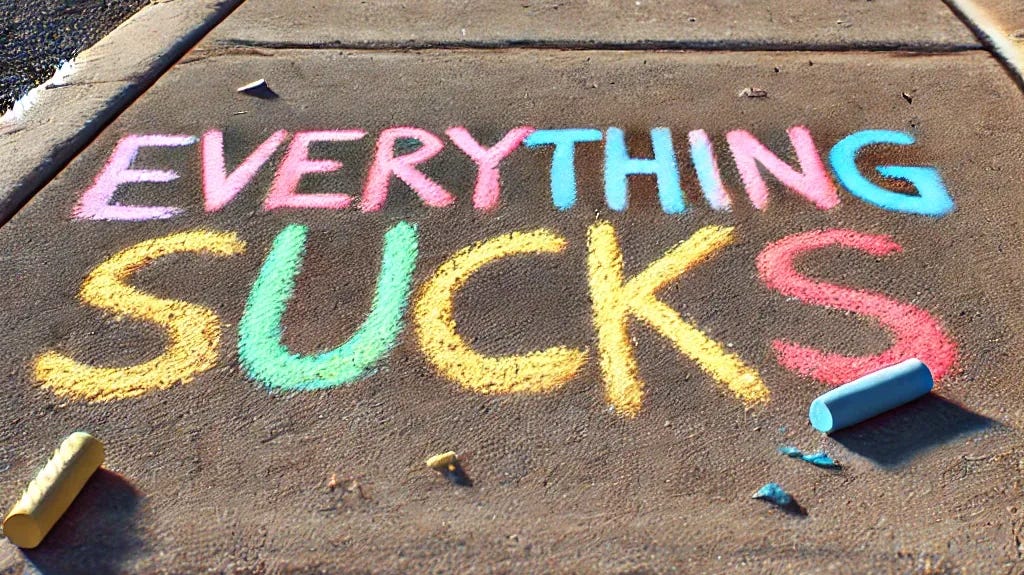Feeling Powerless? Here’s How to Take Back Control
What to do when you don't feel like there's anything you can do.
We’ve all had moments when the world seems to spin out of our grasp. For many people, this past Tuesday felt that way as the US election results came pouring in. For other people, it could be receiving a difficult health diagnosis or working under a boss you’re pretty sure only got promoted as a practical joke.
Or maybe you’re a Bengals fan like me and can’t believe the refs missed TWO penalties on the Bengals two point conversion last night…
Powerlessness is a universal feeling, one that just about everyone will experience at one point or another. While you can’t always control what happens to you, you can control how you respond.
So, how do you flip the script on powerlessness? What do you do in times of despair? Here are 5 tips to reclaim your sense of control and navigate challenging situations with perspective, purpose, and even a bit of levity.
1. Give Yourself Some Grace
First and foremost, it’s important to give yourself permission to feel upset, frustrated, or even powerless without immediately trying to force positivity. In times of stress, it’s easy to put pressure on yourself to “stay positive” or “move on quickly.” But let’s be real: sometimes things just suck, and it's perfectly okay to admit that.
Allowing yourself time to honor your initial reaction can actually make it easier to recover your balance later, because you’re not forcing yourself to smile when all you want to do is cry. Pretending like everything is amazing when it’s not is toxic positivity, which can be just as bad as constant negativity.
Taking a moment to say, “This situation sucks, and I’m allowed to feel that,” is a powerful way to process what’s happening instead of just burying it deep down inside next to your repressed memories of that time you awkwardly asked out your crush in the 5th grade and she rejected you in front of everyone....
2. Acknowledge the Power of Your Reaction
Once you’ve given yourself that grace and you feel ready to move on, it’s time to focus on the things you can control, like your reaction.
How you react to a situation is the one thing you will always have some ability to influence. You can’t (usually) change who’s in charge of the country or your company, but you can adjust your secondary response (the one that comes after your instant gut reaction).
It’s what Viktor Frankl, Holocaust survivor and author of Man's Search For Meaning, called the “last of the human freedoms” – the ability to choose one’s attitude in any given set of circumstances.
Every time you choose how to react, you exercise control. As Frankl’s life shows, even in the most dire circumstances, this choice can be transformative. Because you’re saying to the world that you may be able to control the situation, but you can’t control me.
So when your boss springs yet another last-minute task on you, or the news cycle gets overwhelming, take a beat. Maybe even do what we call a “micro-moment of mindfulness” (yes, that’s a term I just made up). Take a deep breath, notice your thoughts, and then decide what you’re going to do about it.
3. Find Your Influence
Powerlessness often stems from focusing on areas outside your control—things you care about but can’t actually change. Instead, try to shift your focus to what Stephen Covey Called your “circle of control” and “circle of influence,” like your own actions, words, and choices.
You can start with small steps. I can’t change the results of the election and I can’t dictate what may or may not happen over the next four years. But I can reach out to support my friends and family members who are even more devastated or scared of what may come. I can write a newsletter that might help 1 or 2 or 12,000 people feel a tiny bit better about the future.
Whatever the difficult situation, there is likely something you can do to make it just 0.1% better for you or the people you care about. Instead of doom-scrolling or catastrophizing, focus on positive steps you can take in your community or personal life. You may not change the big picture, but you’ll change one pixel that, when stacked up, can start to create a better image.
4. Connect with Others (and Share a Laugh)
Isolation can make powerlessness feel even worse. In tough times, connecting with others can remind you that you’re not alone and you don’t have to do this on your own. It’s not just about serious venting sessions—though that is sometimes what you need—it’s also about finding connection and even laughter.
The physical act of laughing releases endorphins and lowers stress hormones, and just knowing that others understand your struggles can be incredibly affirming. Side note: maybe that’s why people in stock photos are always over the top with laughter? To get the pain of the cheesiness of it all.
If you’re feeling down, reach out to friends, family, or even coworkers who feel the same way. Organize a casual gathering or create a group chat where you can either laugh about the ridiculous situation you’re all facing or create an oasis free from the strife. It’s not about solving every problem; it’s about making the load a little lighter through shared levity.
5. Give Yourself Permission to Feel Joy Again
Just as it’s important to give yourself permission to be upset, you also have to give yourself permission to feel joy.
As I watched the results on Tuesday, I went from optimistic to anxious to nearly despondent, and the feeling only continued when I woke up the next morning. I was in a bit of a zombie-like state for most of the day, trying to process everything from the results to my own emotions. And then in the afternoon, a friend sent me the following photo:
And I laughed. But then I felt guilty for laughing. I thought, “how can I be happy right now given what just happened and what may happen in the near future? Why should I laugh if so many other people are scared or devastated?”
But I should know better than anyone that humor is a powerful coping mechanism. And experiencing levity doesn’t mean you’re ignoring issues or “laughing off” serious matters. Research on humor and resilience shows that finding levity, even in tough situations, can reduce stress, build connections with others, and help you regain a sense of control.
You shouldn’t feel bad when you laugh in difficult times, you should recognize it as strength. Finding a bit of levity is exactly what you need to break free of the feelings of powerlessness because it can be a pathway to controlling your reaction, finding your influence, and connecting with others.
So Choose to Reflect, to Laugh, to Act
Feeling powerless isn’t fun, but it doesn’t have to leave you helpless. By accepting your initial reaction, leaning into the things you can control, and embracing humor and connection, you’ll find you’re more resilient and empowered than you thought.
Once you’ve taken back that power in this moment, you can create a larger plan for what you want to do next.
(an)drew
PS. If you need a bit of levity with everything going on, my Dry Bar Comedy Special is now live! It is behind a paywall but there is a 7-day trial available. Don’t worry, I’ll remind you next week to cancel if you decide to check it out.











Thank you for this. I especially like the comments on small steps, .1%, and what CAN we do. Thank you for framing this up so well.
I just finished reading a book about POW's in Vietnam. The two things that allowed them to survive were community and a code. This is the code we wrote: Code of conduct I am a beloved child of God. I have been given his grace and have been sent into the world to bring love, healing, and wholeness. I am ready to give up my need to ‘be right and in charge’ in order’ to further these aims. I will never use strategies or tactics that bring more hate, harm, and separation into the world. I will take no actions which will support hate, harm, or separation in the world. I will patiently teach and humbly listen to fellow beloved children engaged in the same quest. I will support others engaged in this work in every way possible. Should I become overwhelmed or discouraged, I will reach out to others to be reminded of my connection to the community. If my fellow beloved children reach out to me in discouragement, I will patiently sit with them and hold them in their distress. Afterward, I will bring them to my heavenly father in prayer and do what seems fitting to restore their hope. When my wrongs are pointed out to me, I will humbly ask for forgiveness and seek to be reconciled with my fellow beloved child. I will never forget that I am a beloved child of God, responsible for my actions, and dedicated to bringing love, healing, and wholeness into the world. I will trust in my Father and his son Jesus Christ.
Feel free to adapt it to your deity of choice.